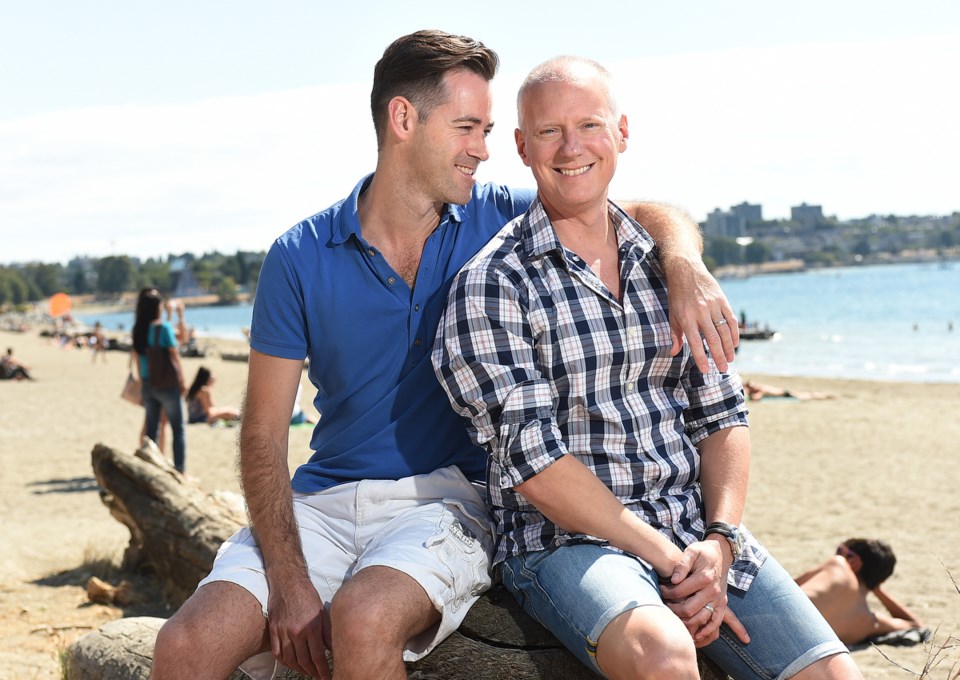The omnipresent rainbow flag that will be flying everywhere as Vancouverites celebrate Pride this weekend is meant to symbolize the diversity represented in the GLBTQ community.
The journeys — geographical, emotional, spiritual — that are celebrated in the Pride parade are vast. This week and next, I will tell two of those stories, which merge into one.
Lonnie Delisle’s religious background was typically Canadian. His parents were a Catholic-United Church mixed marriage and, while theology was a topic of discussion in the home, church attendance was rare. But young Lonnie had an inclination to big questions and when a neighbour in Prince George invited him to a United Pentecostal service, something clicked. He now refers to that branch of Christianity as “very conservative, off-the-charts, cultic actually,” but it appealed because “everything was black and white for me, extremely so.”
He attended a Bible college in California affiliated with that denomination to immerse himself in gospel music and then returned to B.C. and entered Trinity Western. Some people consider TWU pretty hard-core Christian. Delisle, at that point, had a different view. Fairly arcane areas of theology, imbued in him by the United Pentecostal church, gave him a sense of superiority over his fellow students.
“I’m this ‘oneness’ Pentecostal kid who is determined that he’s got the truth and all these Trinitarians are not right about the Godhead so none of them are really saved,” he says now. “I just didn’t believe they were real Christians.”
But he began speaking with profs and fellow students, eventually leaving the United Pentecostal denomination and joining a more mainstream Pentecostal church, a move he said placed him in the role of backsliding apostate among his former fellow believers.
His musical talent led to a 10-year stint as music pastor at Langley’s Christian Life Assembly, a mega-church that is among the largest Pentecostal congregations in the country. Other churches watch closely to see what CLA is doing that is innovative, and Delisle became a highly visible figure in the community. In a denomination heavy on music, Delisle’s role as music pastor was an accomplishment for someone only in his mid-20s.
His religious journey to mainstream Pentecostalism was nothing compared to what was to come. Religiously, he continued to question, moving away from his unequivocal views on God and scripture.
“In the midst of all of that, I was dealing with my homosexuality,” he says. “And being a fairly high-profile leader in the Pentecostal church, I had to do this on the down-low. I heard of this thing called Living Waters.”
Living Waters is a non-denominational ministry that began as part of the “ex-gay” phenomenon, in which people are taught that homosexuality can be “overcome” through religious devotion.
Unlike so-called reparative therapy, which is now being legally banned in some jurisdictions, this was a multi-week group therapy and worship program that intertwined conventional psychology concepts with religion.
“It was, in some ways, actually a healing place for me,” he says. “It was the first time I could talk really about how I felt about sexuality.”
As he explored his own feelings, he felt compelled to tell the church leadership about the rare forays in which he had acted on his desires.
“They didn’t know what to do, but they knew that they needed to do something,” he says.
It was determined that Delisle should take a year off his ministry. But only after admitting “moral failure” in front of two consecutive services on a single Sunday morning, each comprising about 1,800 congregants.
“And then the pastor talked about ‘we don’t throw stones at one another when there is confession and we’re all gonna love Lonnie,’” he recalls. “But it was the most humiliating moment in my life.”
The “restorative process” required that he continue to attend the church where he had been a leader but had fallen.
“It was humiliating, but I thought, well this is the pathway to salvation, as it were,” he says. “Then I was restored, as they put it, restored back into ministry. And people were quite accepting and gracious. They did the best that they knew how to do, the church did. Both the leadership and the congregation. We were all in this muddled theology together.”
But the experience took its toll. His theological opinions were changing — and his feelings on homosexuality, too.
“That’s when the wheels started coming off for me on Pentecostalism,” he explains. He moved from church to church, progressively away from the evangelical side.
On the other side of the world, a remarkably similar transformation was happening to another young man.
At a Living Waters conference in Cape Town, South Africa, in 2005, Delisle had met Hannes van der Merwe. Delisle was at the conference as worship leader. Van der Merwe was there under the auspices of learning to counsel people with “sexual brokenness.”
In this most unlikely of venues — or was it, really? — Delisle and Van der Merwe began to discover they had an enormous amount in common.
In the confines of a conference dedicated to fighting off “sinful” feelings and actions, the two men acknowledged, employing some of the convoluted jargon learned at the conference, that they were attracted to each other. Van der Merwe asked if this acknowledgement meant they could not be friends.
“I said no,” Delisle recalls now with a slight grin, “I’m sure it’s quite fine.”
… Continued next week.
Happy Pride Day, B.C. Day or whatever you are celebrating.



